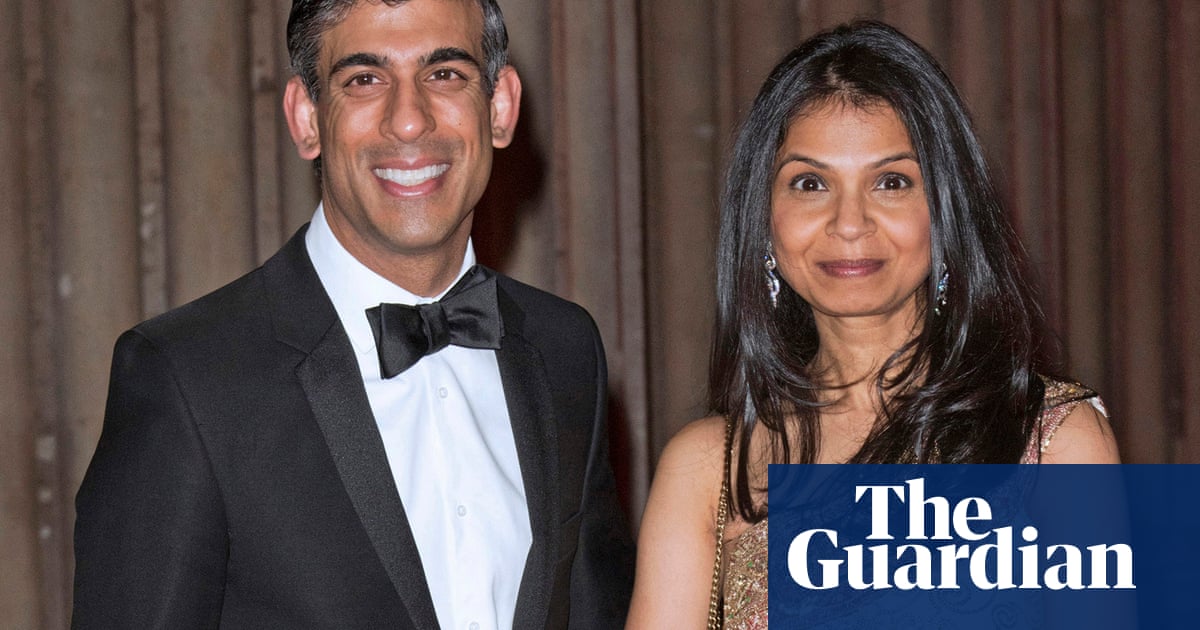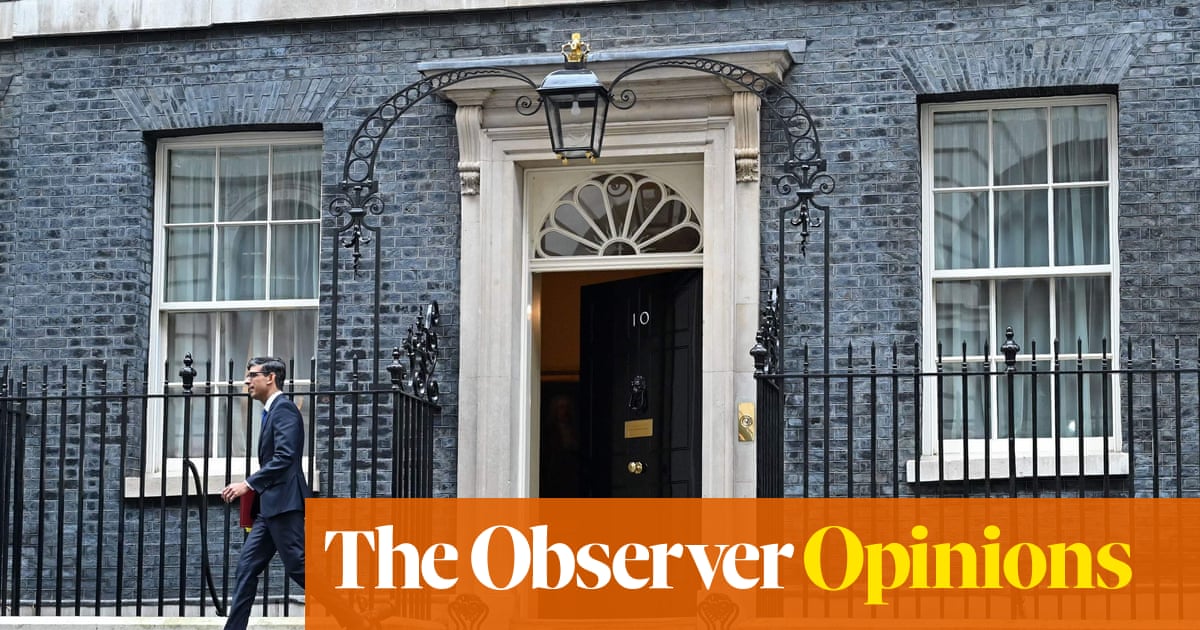
Rishi Sunak sounded every inch the gallant, protective husband. His wife, Akshata Murty, hadn’t asked to be in the public eye, the chancellor told the BBC plaintively, and he had found it “very upsetting” when she was targeted. Her money was her money, and the stake she held in the multibillion-pound family business Infosys – which was then still doing brisk trade in Moscow even as Sunak exhorted companies to cut ties with Russia – was strictly her affair, not his.
After all, isn’t every woman entitled to a professional life independent from her husband’s? The chancellor even wryly compared himself to the actor Will Smith, who lashed out at the comedian Chris Rock after the latter joked about his wife’s hair, as if being reportedly richer than the Queen was just Akshata’s rotten luck too.
Only now it turns out there’s another, somewhat less endearing theory for why the chancellor might be anxious to move on from the subject of her fortune, and it’s that she doesn’t pay British tax on a chunk of it. Taxes are rising for millions of Britons this month, but in the Sunak household, well, maybe not so much. For Murty has been revealed as a non-dom: she pays British taxes on any earnings in this country but not on any income overseas, a perfectly legal choice but one that could conceivably have saved the Sunak household a tidy sum. And, to be clear, it is a choice, much as her husband’s decision not to uprate benefits this month in line with unexpectedly soaring inflation was a choice.
Murty retains Indian citizenship. That’s something she has every right to do, just as Nick Clegg’s wife, Miriam, had every right to remain a proud Spanish citizen when he was in government. But tax experts argue that the chancellor’s wife could have opted to pay tax in the country where her husband sets it. That she didn’t is, arguably, not surprising: in the circles in which she moves, it might seem crazy to risk the family inheritance just to spare a husband’s political blushes. What really is astonishing, however, is that the chancellor seemingly imagined he could keep all this private, even while hiking taxes on people with nowhere to run from them.
There are few more damaging charges in politics than “one rule for them, another for the rest of us”, as Boris Johnson so helpfully demonstrated by presiding over a regime that repeatedly broke its own Covid rules. Yet his supposed heir apparent has just walked straight into the same elephant trap.
Plenty of Conservative voters can cope with a leader who is cheerfully and unashamedly rolling in it, even in the middle of a crippling squeeze on living standards. Just look at the way they have indulged Jacob Rees-Mogg down the years. Nor should it prove impossible for a rich politician to govern well for the poor, given some capacity for human empathy and – call me a hopeless old romantic – the existence of data. Politicians who actually listen to the evidence in front of them and choose advisers capable of filling in their blind spots can and often do transcend their own narrow personal experiences; for anyone aspiring to lead a whole country, that’s literally the job description. But what all voters can smell a mile off is politicians trying to pass themselves off as what they’re not, and Sunak’s everyman act is now wearing decidedly thin.
Borrowing a suitably humble-looking hatchback off a supermarket worker instead of using one of his own more luxurious cars for a post-budget photo opportunity at the petrol pumps was clumsy but understandable, given that chancellors normally travel courtesy of a government driver. But failing to clarify his wife’s tax arrangements in public, awkward as that might make dinner with the in-laws, is in a different league.
Non-dom status was a major political dividing line at the 2015 election, and Ed Miliband threatened to scrap it if Labour won. Scrapping or restricting it has been at least a theoretical option for Sunak, too, at every budget or spring statement he has delivered. How long did the chancellor imagine he could avoid disclosing this very personal interest in public? What else do we not know about his wife’s finances? And without full disclosure, how can we be sure his family circumstances aren’t shaping his decisions, even subconsciously?
For Sunak, all this is hideously toxic. So toxic, indeed, that he could be forgiven for wondering where the constant drip, drip, drip of damaging information about his gilded lifestyle – the £335 trainers in which he was recently photographed, the £100,000 personal donation the Sunak-Murtys have made to his old public school – could be coming from, as the Metropolitan police’s Partygate inquiry wends its way inexorably towards the prime minister’s door.
The single biggest deterrent for despairing Tory MPs agonising over whether to trigger a leadership election is the fear of detonating something whose outcome they can’t control or predict. If Sunak no longer looks like a sure thing, a reliable plan B likely to be accepted across the party, then putting in a letter to the 1922 committee becomes an altogether wilder roll of the dice.
But the truth is that whatever dark arts are being practised in dark corners, Sunak’s star has been quietly waning for a while. The chancellor’s job is to say no, but the Treasury’s tightfistedness at a time of huge demands on the state evidently grates on some colleagues. In the absence of a clear Tory agenda driven by the prime minister, Sunak hasn’t noticeably seized the opportunity to create one.
His biggest remaining asset was his air of general wholesomeness, a sense that in contrast to his chaotic neighbour here was a devoted family man with no skeletons in his closets or wild, Covid-defying parties in his basement, and with sound political judgment to boot. But in failing to go on the front foot over what was always going to be the tricky issue of his family’s wealth, the chancellor has effectively dented his own brand.
Faintly mad as this sounds, it now looks more likely than it did that Johnson will lead this government into the next election; that the greased piglet, in David Cameron’s immortal phrase, will wriggle free, if only because his party has run out of better ideas. If it all goes pear-shaped, Sunak will doubtless have other options. What a shame the rest of the country can’t say the same.












